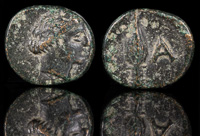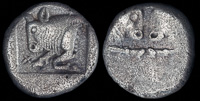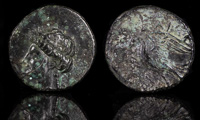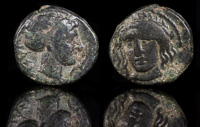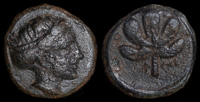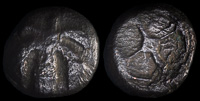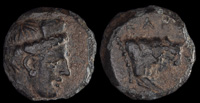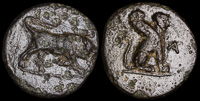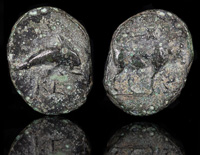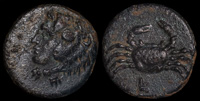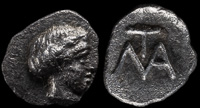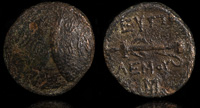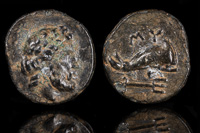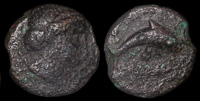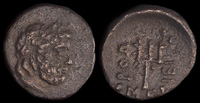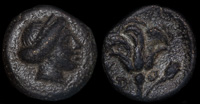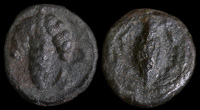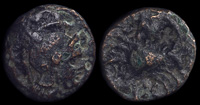Caria
Approximate foundation of Knidos by Dorian settlers.
The poet Erinna is born on Telos.
Lipara is colonized by settlers from Knidos.
The Persians under commander Harpagos conquer the area around Idyma.
Kaunos bitterly resists the Persians of Harpagos, but are defeated.
The historian Herodotus is born in Halikarnassos.
Five ships from Nisyros accompany Artemisia of Halikarnassos, but they defect to the Greek side.
September 26
Aegina plays a significant role in the Greek naval victory against the Persian Empire in the Battle of Salamis. Byblos, Arados, Tyre, Halikarnassos under Artemisia, Kos, and Sidon support Darius. Chalkis and Kythnos support the Greek effort. Alexander I serves as a peace negotiator on behalf of the Persians.
August 27
The tyrant Lygdamis II puts to death the poet Panyasis, which causes the historian Herodotus to leave Halikarnassos.
Rhodes remains neutral, though still a member of the Delian League, during the Peloponnesian War.
Kos is devastated by an earthquake.
Iasos is governed by Amorges, a Persian who had achieved independence from Persia. Iasos is attacked by Spartans, who deliver Amorges to Tissaphernes and plunder the city.
Kos is sacked by Spartan forces.
The Spartan Lysander takes Iasos, kills all men of fighting age, sells the women and children into slavery, and levels the city.
Hekatomnos becomes king of Caria, then including Halikarnassos, under the Persian Empire.
Euromos participates in the rebellion of the Persian satrap Cyrus the Younger against his brother, King Artaxerxes II.
The Spartan admiral Peisander is defeated and killed by a fleet headed by Pharnabazos and former Athenian admiral Konon at the Battle of Knidos.
Birth of philosopher Eudoxos at Knidos.
Peace of Antalkidas, arranged by Artaxerxes II, is signed in Susa, ending the Corinthian War. Abydos, Aigai, Kalchedon, Kaunos, Klazomenai, Kyzikos, Parion, Samos, and Adramytteion become part of the Persian Empire.
Approximate birth of Memnon of Rhodes, presumably in Rhodes.
Eresos, Byzantion, Chios,Mytilene, Methymna, Rhodes, Thebes, Korkyra, Eretria, Kios, Samos, Naxos, Andros, Myrina (Lembos), Hephaistia, Imbros, and Thasos join the Second Athenian League, reaffirming its alliance with Athens in response to the growing threat of Persian interference and internal Greek conflicts.
Mausolos moves the capital of the Hekatomnid Satrapy from Mylasa to Halikarnassos.
Several cities on Kos combine to form the Kos harbor.
Phaselis concludes a treaty with Mausolos of Halikarnassos.
355 BCE
King Mausolos of Caria conquers Rhodes.
350 BCE
Construction of the Mausoleum of Halikarnassos, one of the Seven Wonders of the World.
Death of Mausolos at Halikarnassos and reign of his sister Artemisia II.
Death of Artemisia II at Halikarnassos and reign of her brother Idreios.
Death of Idreios at Halikarnassos and reign of his wife and sister Ada.
Ada is usurped by her brother Pixodaros in Halikarnassos.
Rhodes is conquered by Persia.
Alexander the Great besieges and eventually takes Halikarnassos, which is strongly defended by Memnon of Rhodes.
Alexander III attempts to take Myndos, but is repulsed.
May
The Battle of the Granicus, during which Alexander the Great defeated the Persians under Darius III, and after which Adramytteion and Kaunos come under his control. Kalas participates with the Thessalian cavalry under Parmenion. Perdikkas serves on the right.
326 BCE
Ptolemy II Philadelphos is born on Kos to Berenike I and Ptolemy I.
The painter Apelles, famous for his work at the Asklepion, dies on Kos.
Demetrios Poliorketes attempts to enlist the help of Rhodes, but fails.
Demetrios Poliorketes besieges Rhodes and invents many new siege engines for the purpose (earning him the title ‘besieger’) but he fails and is forced to leave them. Knossos provides troops to support Rhodes.
Patara is used as a naval base by Demetrios Poliorketes during his siege of Rhodes.
Eupolemos is believed to have served as a general under Pleistarchos in Mylasa.
Estimated death of Pleistarchos. Eupolemos succeeds him at Mylasa.
Kos comes under Antigonos II Gonatas.
An earthquake destroys Kamiros.
216 BCE
The Lyttian War is fought between an alliance led by Knossos and one led by Polyrhenion. On the side of Knossos were Rhodes, the Aetolian League, and Kydonia. On the side of Polyrhenion were Lyttos, Macedon, and the Achaian League.
Eleutherna triggers the Lyttian War by accusing Rhodes of murdering their leader Timarchos.
Mithridates II unsuccessfully attempts to take Sinope, which is helped by Rhodes.
197 BCE
Rhodes re-takes Stratonikeia.
Antiochos III is defeated by Scipio Asiaticus at the Battle of Magnesia.Through treaty, Ephesos comes under the Attalids. Alabanda comes under Roman control.
Livius is sent to Anatolia and the cities of Miletos, Myndos, Halikarnassos, Knidos, and Kos are friendly.
The consul Gnaeus Manlius Vulso defeats Tabai, who had blocked his path, and fines them.
Treaty of Apamea. Euromos, Laodikeia ad Lykon, Sestos, and Abydos returned to the Kingdom of Pergamon.
Lycia, including Phaselis, and Caria, including Stratonikeia, are given its freedom from Rhodes by Rome.
Rhodes becomes a permanent client state of Rome.
Stratonikeia leads a revolt of cities against Rome.
With the help of Mithridates VI, the inhabitants of Kaunos kill all Romans in their city.
Mithridates VI stays for some time at Stratonikeia and marries one of its citizens.
Julius Caesar travels to Rhodes to study with Apollonius Molon.
While on his way back from Rhodes, Julius Caesar is intercepted and ransomed by pirates.
Phanagoria, Nymphaion, Chersonesos, and Theodosia revolt against Mithridates VI.
Telos is conquered by the Romans.
Quintus Labienus takes Alabanda with a Parthian force. His men are then slaughtered by the inhabitants, but the Parthians then loot the city.
Labienus takes Mylasa during the Roman Civil War, causing great damage.
Quintus Labienus and his Parthian troops besiege Stratonikeia.
Construction of the Temple of Zeus Lepsinos begins in Euromos.
St. Paul visits Kos.
A major earthquake destroys Rhodes. Funds for is rebuilding are given by Antoninus Pius.
Kamiros destroyed for the second time by an earthquake.




